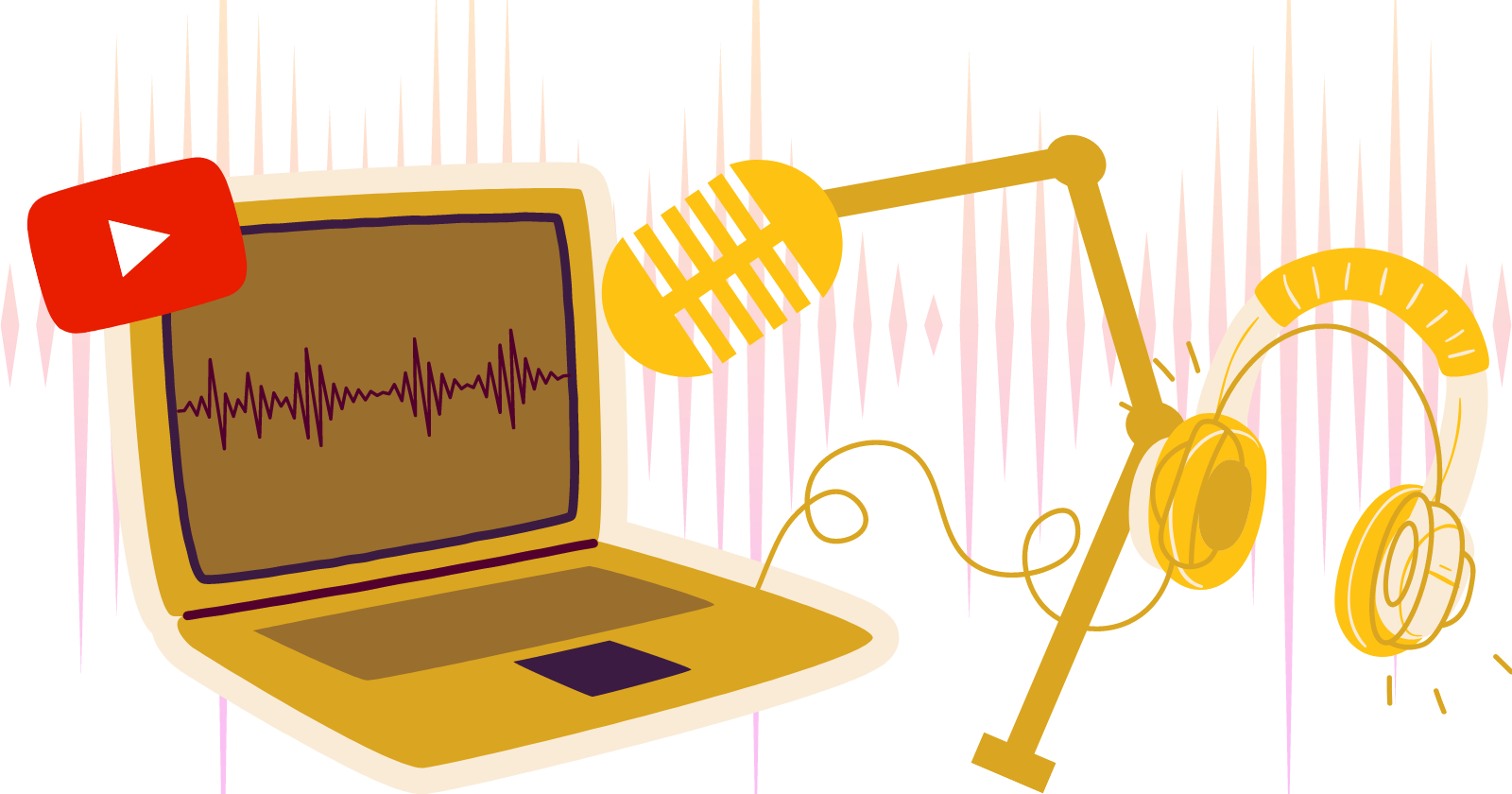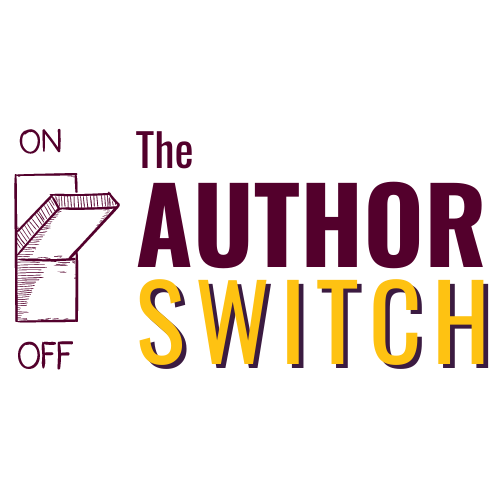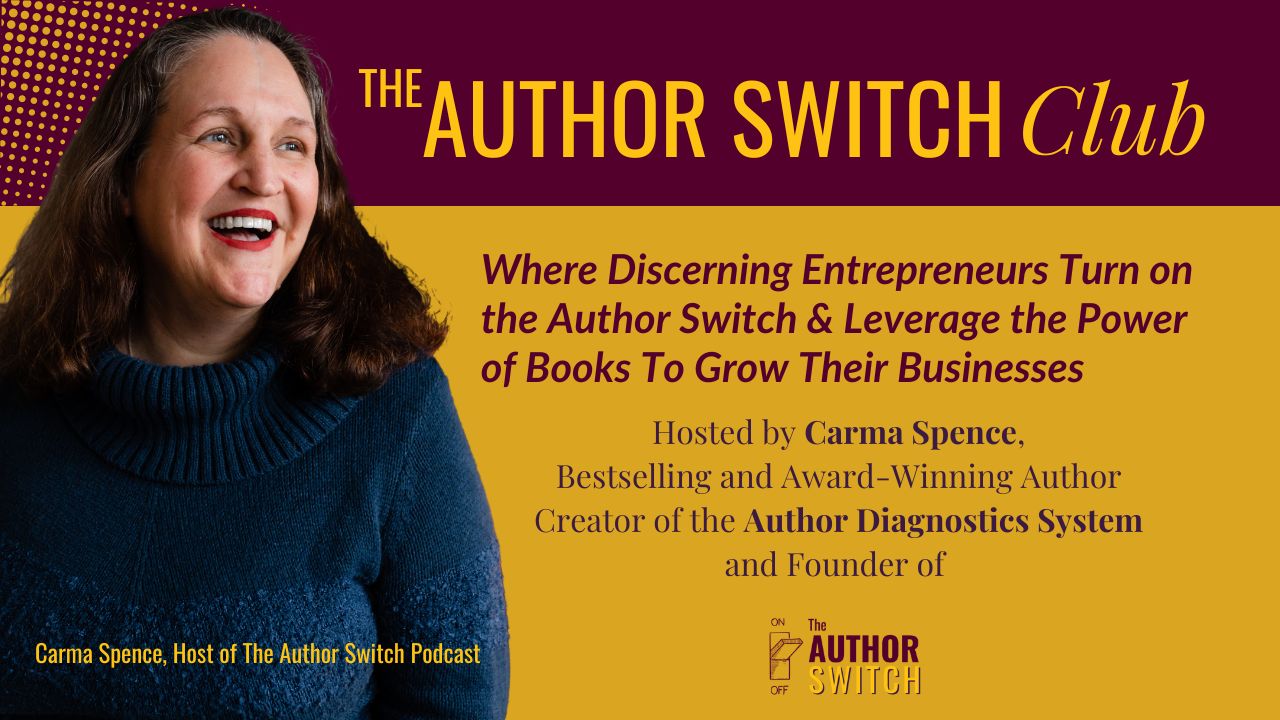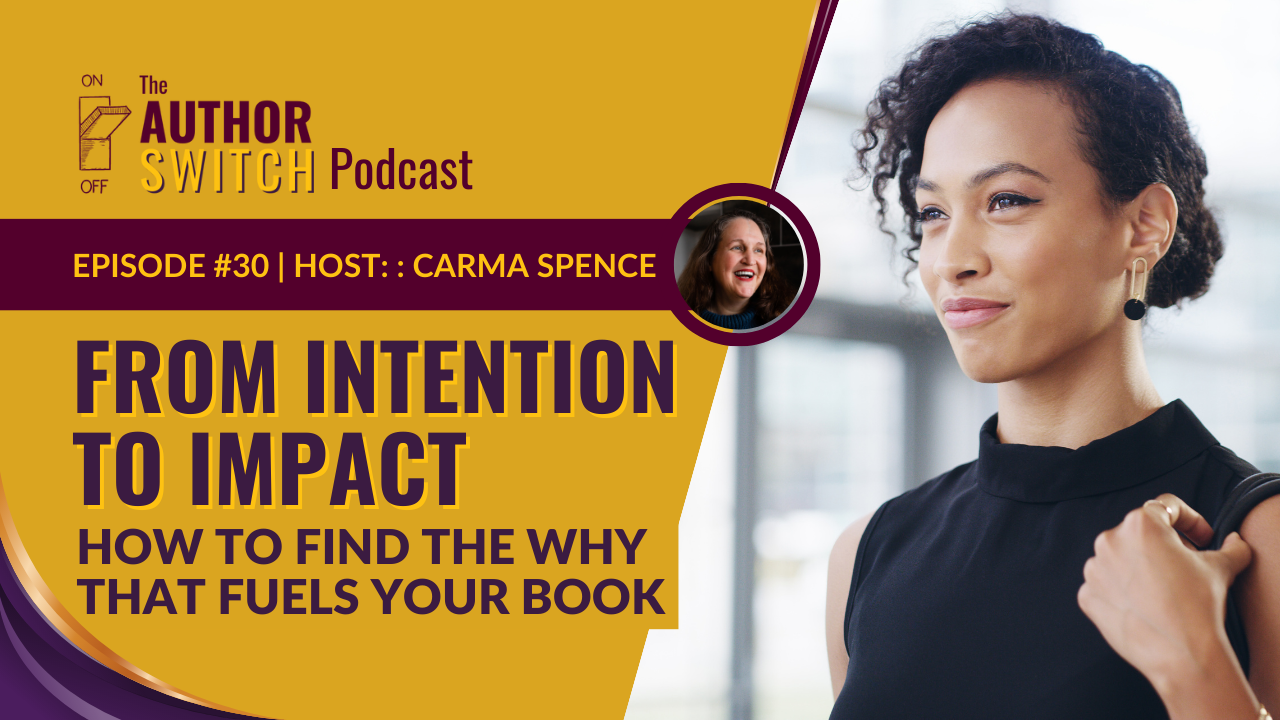March 18, 2024
Episode 62: What Would Oprah Do?
Tackling Writer’s Block with Inspiration from the Greats
Learn Creative Tips from Oprah and Master Authors
Episode 62: What Would Oprah Do? Tackling Writer’s Block with Inspiration from the Greats
Notes
Have you ever struggled with writer’s block? Don’t worry, you’re not alone. Even the most talented writers can hit a wall when it comes to finding inspiration. But what sets successful writers apart is their ability to overcome this hurdle.
That’s why I’m excited to share this episode of The Author Switch Podcast in which I share the strategies that successful writers have used to overcome writer’s block and find inspiration in even the toughest situations.
Recap & Takeaways
- 01:15 Maya Angelou
- 01:47 Virginia Woolf
- 02:38 Ernest Hemingway (#1)
- 03:14 Mark Twain
- 04:03 Stephen King
- 04:47 John Grisham
- 05:35 Anne Lamott
- 07:00 Dan Brown
- 07:48 Douglas Adams
- 10:11 Toni Morrison
- 10:52 Agatha Christie
- 11:41 John Steinbeck
- 12:26 Graham Greene
- 12:54 Truman Capote
- 13:35 Ernest Hemingway (#2)
- 14:36 Ernest Hemingway, J.R.R. Tolkien and C.S. Lewis
- 15:10 Oprah #1
- 15:50 Oprah #2
- 16:48 Oprah #3
- 17:31 Oprah #4
Resources Mentioned
Transcript for Episode 62: What Would Oprah Do? Tackling Writer’s Block with Inspiration from the Greats
The best thing you can do to take your life, your business, your book to the next level is to take advice from masters of the past. And in this episode of The Author Switch, I’m going to be sharing with you some tips, advice, and ideas from master authors, as well as Oprah herself.
Hi, I’m Carma Spence, and I help entrepreneurs and small business owners write a lead- and client-attracting book in 90 days or less. Welcome to The Author Switch. And in this episode, I’m going to be sharing with you some ideas of master authors from the past that might help you move your book, your life, and your business forward.
So let’s get to it. Tip number one, set a daily routine. Now, I know I’ve said in the past it doesn’t have to be daily. This is true. Some authors swear by it. Maya Angelou believed that the power of routine, writing in hotel rooms to keep her process consistent and freed her from distractions. And I know of other authors who’ve also believed in a daily, weekly writing routine.
In other words, it’s the regularity of the routine that helps you keep writing.
Idea number two. Embrace solitude.
Virginia Woolf once said, “I need solitude. I need space. I need air. I need the empty fields around me, my legs pounding along roads, and sleep, and animal existence.” She advocated having a room of one’s own to think and write, without interruption, emphasizing the importance of personal space in creative work.
Now, sometimes you can have a room of your own, but sometimes all you need is a nook. What I’ve found is whether you’re alone or in a room full of noise, if you have your own personal space where you do your writing, it helps you focus in on that writing, even if there’s chaos going on around you.
Idea number three, write freely, edit later.
Now, this is something from Ernest Hemingway. He said, ”Write drunk,” metaphorically speaking, “and edit sober.” He suggested that you needed the space to just write whatever came out and then you edit it later. That’s why I highly advocate that you just don’t edit as you’re going. Just write, get the words out.
The editing process is where you polish and fine tune and add transitions and put in commas, all that good stuff. Just write. Get it out. Get it out. Get it out.
Idea number four, change your environment. Mark Twain preferred writing in bed, proving that a change in scenery can boost creativity. Now, does that mean you need a cabin in the woods to write a good book?
Maybe. Maybe not. If you’ve ever seen that episode of Dick Van Dyke, it’s on the maybe not part, but You Maybe you need to go write a chapter in a coffee shop or rent a room in a local hotel and write a chapter or two there, or maybe go to the library. You can change your scenery and maybe get those creative juices going.
Hey, maybe your muse is just bored with your desk and wants to go to a coffee shop once in a while. Take her on a writing date.
Idea number five, read voraciously. Now, Stephen King said in his memoir On Writing, you have to read widely, constantly refining and redefining your own work as you do so. And I’ve also got to see Ray Bradbury speak, and he also advocated reading widely.
Read in your own genre. Read outside of your genre. Read fiction. Read nonfiction. Read magazines. Read newspapers. Read. Read. Read. Read some more. Because it’s by listening to and feeling the language as it’s used in the real world that helps you develop and hone your own unique voice.
Idea number six. Write daily.
Another daily. Now, John Grisham started his writing career by committing to writing one page a day and showing the power of small, consistent efforts. In fact, some authors have advocated, write X number of words every day and don’t go above it or below it, just consistently write that many number of words a day.
And so I suggest that you try that out. It may work for you. It may not. That’s why I’m giving you all these ideas because some will work, and some may not. And that’s totally okay. You experiment with writing different ways to find what works for you. To find your writing flow. Because what works for one author, doesn’t work for the other, and vice versa.
Idea number seven, and that is break your work into small chunks. That’s one reason why I advocate outlining because that naturally breaks your work into small chunks. And then you focus in on that one chunk at a time. And this idea comes from Anne Lamott, who wrote Bird by Bird, and she reminds writers to take it one step at a time, focusing on the immediate task rather than the entire project.
And I have to admit that by doing that, it really helps you write those pieces better. So, for example, when I was writing Public Speaking Super Powers. I took each chapter, and I took all the interviews that I had done, and I pulled all the quotes that were about that particular chapter, and I piled them up and I ignored all the rest.
I only paid attention to the quotes that were relevant for the chapter I was writing. And it really helped me plow through that more quickly because once I got all that pre work done, it only took me a couple of days to get the first draft done because I was doing it one section at a time. And focusing on honing that section, and then the next, and then the next.
It also helps get rid of the overwhelm of, Oh my gosh, I have to write a book. You’re making it, Oh my gosh, I have to write this subsection, or this section, or sometimes even this paragraph.
Idea number eight, and that is find your best time to write. Dan Brown, he starts writing at 4am.
leveraging quiet hours for more productivity. Frankly, I can’t get up at 4am unless my body, like, needs to do body things. And then I go back to sleep because that’s just way too early for me. And honestly, I’m not as creative first thing in the morning. Some of my best writing time is like mid-morning or mid evening.
Those are my best writing times. What’s the best writing time for you? You may be a morning person. You may be a midday person. You may be an evening person. You may be a late-night person. Don’t follow somebody else’s prescription of when you should write. Follow the one that works best with your personal circadian rhythm.
Idea number nine, and that is set deadlines. Douglas Adams famously quipped, ” I love deadlines. I love the whooshing noise they make as they fly by.” Now that underscores the motivational power of deadlines, even if they’re self-imposed and you don’t always make them. The key here is set the deadlines, do your best to honor them, but don’t be hard on yourself if your self-imposed deadlines don’t happen.
For example, I had my deadlines set up so that I could get my book out in February on a specific date. And life conspired to make sure that didn’t happen. And so I went with it. I still got it out in February, just not on the day in February I had in mind. Life happens. Sometimes you get sick. Do you ever plan for being sick?
Of course not, because you don’t want to be sick, but sick happens. Or a child gets sick, or a spouse gets sick, or a parent gets sick, and it just derails everything. Or sometimes other things happen. Set deadlines, do your best with the intention of meeting them, and if you don’t, go easy on yourself.
Now, I’d like to take a quick moment to hear a word from our sponsor.
[BEGIN COMMERCIAL BREAK]
Every great book begins with a single idea, but what transforms that idea into a masterpiece? Introducing All You Need is the Right Roadmap, your guide to navigating the writing process with ease and confidence. Unlock the secret to creating an outline that not only structures your book, but also inspires your writing journey.
Embark on the path to writing success. Your adventure begins now on Amazon.
[END COMMERCIAL BREAK]
Before the break, I was sharing with you some quotes and some ideas from famous authors from Maya Angelou, from Virginia Woolf, Ernest Hemingway, Mark Twain, Stephen King, John Grisham, Anne Lamott, Dan Brown, and Douglas Adams. And now I have a few more to share with you.
The first one comes from Toni Morrison, and that is use writing prompts. She suggested that sometimes creativity needs a little nudge. And so a prompt can spark that nudge, can spark that ignition. I’ve loved using writing prompts and in fact, I love them so much that in my free Facebook group… I will put the link in the show notes, but if you want that sooner than this episode comes out you can drop FACEBOOK GROUP in the comments, and I will send you the link to my free Facebook group because every Saturday I drop a new writing prompt that is aimed at helping you write something that will help your business.
Next idea, idea number 11, and that is take breaks. Agatha Christie believed in the value of letting the subconscious mind work on writing puzzles while engaging in other activities like doing the dishes. So, I use this technique sometimes, I dance. Sometimes I do the dishes, sometimes I reorganize my home, or sometimes I work on a different writing project.
It’s amazing how much ideas for this writing project will happen while I’m working on that writing project. So I usually have multiple writing projects going on at the same time because they feed on each other and inspire each other. So you can try that, taking a break from this project so that it can percolate in the back of your mind where your creativity is getting ready to give you great ideas.
Idea number 12, write to one person. When you write, imagine you’re writing to one specific person. This idea comes from John Steinbeck, and it helps you create a more intimate and engaging narrative. So you might create an avatar and I don’t know, let’s name her Sarah and you know that Sarah loves whatever it is you talk about.
And so you’re writing for Sarah. And you know what? When you write for Sarah, you write for everyone who’s your ideal client because everyone who is meant to work with you has something in common with Sarah. That’s what I suggest.
Idea number 13. Lucky 13. And that is limit your writing time. And I did mention that a little bit earlier when I was talking about writing daily.
And this idea comes from Graham Greene, who never wrote more than 500 words a day. Proving that limiting time can enhance focus and productivity. So it’s when you can only write 500 words a day, you get very creative about what those 500 words are. This may be a tip that works for you.
Tip number 14 comes from Truman Capote, and that is rewrite and revise.
He was famous for meticulous revision process, reminding us that great writing often comes in the rewriting. It’s like I said earlier, Sometimes, I love the editing portion of writing because, for me, the writing is like the get the idea on paper. Editing is where the creativity gets, it’s like you, it’s like the writing is creating the lump of coal and editing is crushing it into a diamond.
Even more, it’s polishing it and making a diamond worth being on a diamond ring.
Idea number 15, ignore the critics, really. Just ignore them. Ernest Hemingway advised to write for yourself and not worry about critics, highlighting the importance of staying true to your voice. And this is something I’ve observed in the real world because critics are often not your peeps.
And the people who are criticizing you are often not the people you’re trying to reach. So why try to please them? You want to try and please and cater to the people you were meant to serve. And if someone is not liking what you’re dishing out, maybe that dish wasn’t meant for them.
It’d be like if you were making this wonderful dish of eggplant, I can’t stand eggplant. I’m not going to eat it. I’m not your peep. Childhood trauma related to that, so don’t think I’m dissing eggplant. It’s a long story, ask me at a cocktail party sometime, I’ll tell you.
Idea number 16 is: find a writing community.
Joining a group of fellow writers for support and feedback, which has been championed by many, many authors, including Ernest Hemingway and the Inklings, which is a group that included JRR Tolkien and CS Lewis, two very good authors.
And now I would like to share with you four tips from the one and only Oprah, because I did call this podcast, What Would Oprah Do?
So these are some things that Oprah would do. Listen to your inner voice. She frequently emphasizes the importance of listening to your intuition and gut feelings as a guide. For writers, this could mean paying attention to the stories or ideas that deeply resonate with you, even if it seems challenging or daunting at first.
Go with your gut. And that’s another reason why you might not want to listen to the critics because sometimes you’ll listen to the critics and you’re like, you know, they have a point. And other times you’re like, Okay, what were you smoking? So take everything with a grain of salt, go with your gut because your gut is in more alignment with your muse than anything else.
Another Oprah idea is: embrace failure as a teacher. Oprah views failure not as a setback, but as a stepping stone for greater success. She encourages embracing failures and setbacks as learning opportunities.
Writers can apply this mindset to viewing blocks and challenges as they show up and use them to refine your craft because, you know, stuff happens. You’re going to make mistakes, and sometimes you’re going to make the same mistake more than once. It happens. But each time, learn from it, because failure is a stepping stone to success.
It really is. If, if, you look at failure as a learning opportunity rather than a big signpost that says “you suck.” Just saying.
Another Oprah tip is to find your purpose. Oprah often speaks about the importance of knowing your purpose, knowing your why, and then aligning your actions to it.
When you know what you are here for, and while you’re writing this book, you are better able to write past the struggles. In fact, an earlier episode of The Author Switch talked all about finding your why so that you can make a greater impact. I will include a link to that in the show notes, but if you want that link sooner, write IMPACT in the comments and I will get back to you with the link to that episode.
And finally, the last tip from Oprah is practice gratitude. Oh my gosh, what great, great advice. She is a strong proponent of being thankful and maintaining a gratitude journal and focusing on the positive aspects of life. Am I the only one who’s got Always Look on the Bright Side of Life playing in their head now?
Always look on the bright side of life.
Anyway, momentary Monty Python moment. This practice of doing a gratitude journal, I did a gratitude journal for years and it really helps me get out of some really sticky parts of my life.
And this is a great way for writers to, if you’re struggling with self-doubt, imposter syndrome, a gratitude journal can really help pull you out of that particular morass.
And it is a crucial, crucial step in creative thinking and overcoming blocks. So I highly recommend gratitude work, whether it’s a journal or just thinking about what you’re grateful for every single day. I include it in my daily prayers. I thank God for a lot of things because God has been good to me.
Well, that is what I’ve got for you today. I look forward to seeing you in the next episode of The Author Switch. This is Carma Spence, your host of The Author Switch, saying ciao for now.
Stay Tuned For Our Latest Episodes
Start Listening Today!
Want to be on the podcast?




